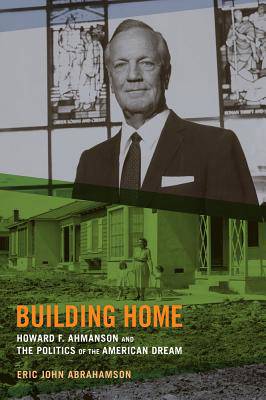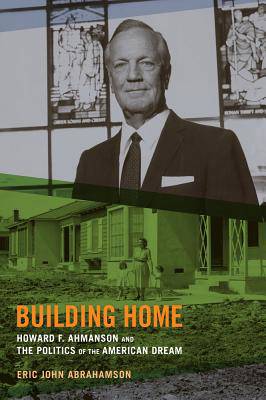
- Afhalen na 1 uur in een winkel met voorraad
- Gratis thuislevering in België vanaf € 30
- Ruim aanbod met 7 miljoen producten
- Afhalen na 1 uur in een winkel met voorraad
- Gratis thuislevering in België vanaf € 30
- Ruim aanbod met 7 miljoen producten
Zoeken
Building Home
Howard F. Ahmanson and the Politics of the American Dream
Eric John Abrahamson
Hardcover | Engels
€ 59,45
+ 118 punten
Omschrijving
Building Home is an innovative biography that weaves together three engrossing stories. It is one part corporate and industrial history, using the evolution of mortgage finance as a way to understand larger dynamics in the nation's political economy. It is another part urban history, since the extraordinary success of the savings and loan business in Los Angeles reflects much of the cultural and economic history of Southern California. Finally, it is a personal story, a biography of one of the nation's most successful entrepreneurs of the managed economy --Howard Fieldstad Ahmanson. Eric John Abrahamson deftly connects these three strands as he chronicles Ahmanson's rise against the background of the postwar housing boom and the growth of L.A. during the same period.
As a sun-tanned yachtsman and a cigar-smoking financier, the Omaha-born Ahmanson was both unique and representative of many of the business leaders of his era. He did not control a vast infrastructure like a railroad or an electrical utility. Nor did he build his wealth by pulling the financial levers that made possible these great corporate endeavors. Instead, he made a fortune by enabling the middle-class American dream. With his great wealth, he contributed substantially to the expansion of the cultural institutions in L.A. As we struggle to understand the current mortgage-led financial crisis, Ahmanson's life offers powerful insights into an era when the widespread hope of homeownership was just beginning to take shape.
As a sun-tanned yachtsman and a cigar-smoking financier, the Omaha-born Ahmanson was both unique and representative of many of the business leaders of his era. He did not control a vast infrastructure like a railroad or an electrical utility. Nor did he build his wealth by pulling the financial levers that made possible these great corporate endeavors. Instead, he made a fortune by enabling the middle-class American dream. With his great wealth, he contributed substantially to the expansion of the cultural institutions in L.A. As we struggle to understand the current mortgage-led financial crisis, Ahmanson's life offers powerful insights into an era when the widespread hope of homeownership was just beginning to take shape.
Specificaties
Betrokkenen
- Auteur(s):
- Uitgeverij:
Inhoud
- Aantal bladzijden:
- 368
- Taal:
- Engels
Eigenschappen
- Productcode (EAN):
- 9780520273757
- Verschijningsdatum:
- 28/02/2013
- Uitvoering:
- Hardcover
- Formaat:
- Genaaid
- Afmetingen:
- 165 mm x 234 mm
- Gewicht:
- 635 g

Alleen bij Standaard Boekhandel
+ 118 punten op je klantenkaart van Standaard Boekhandel
Beoordelingen
We publiceren alleen reviews die voldoen aan de voorwaarden voor reviews. Bekijk onze voorwaarden voor reviews.











